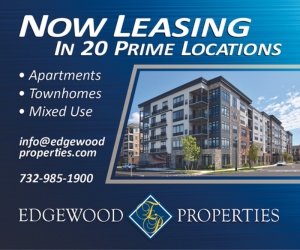Ironstate Development and Roseland Residential Trust, a subsidiary of Mack-Cali Realty Corp., opened the 69-story apartment tower known as Jersey City Urby earlier this year. In May, the developers became the first in the region to partner with Airbnb through the company’s Friendly Buildings Program. — Building photo courtesy of Jersey City Urby/Illustration by Real Estate NJ
By Joshua Burd
For someone who aims to be forward-thinking and mindful of industry trends, David Barry saw an opportunity at Ironstate Development’s new 69-story apartment tower in Jersey City.
He had watched the growth of Airbnb, believing that many younger renters were already using the home-sharing platform. Partnering with the service would allow for greater security and transparency in the process, he said, especially for a trend that he believes “is here to stay.”

It would also become a distinctive perk for tenants at the building known as Jersey City Urby.
“Having the ability to use home-sharing sites has become increasingly important to renters,” Barry, president of Ironstate Development, said earlier this year when the firm announced such a partnership. “By aligning with Airbnb, Jersey City Urby is able to give residents this option, as well as simplify the hosting process so they can enjoy their time away from home.”
The 762-unit tower, a joint venture of Ironstate and Roseland Residential Trust, became the first new building in the region to participate in Airbnb’s “Friendly Buildings Program.” As such, residents can now rent out their entire apartments or a private room for up to 30 days per year.
It also became the most high-profile example to date of a concept that is now spreading to New Jersey. The growth of the sharing economy — including platforms such as Airbnb and Uber — has created new opportunities for developers and landlords, providing additional ways for them to appeal to renters and help their projects stand out in an increasingly crowded market.
Late last year, Capodagli Property Co. announced that it had partnered with Uber at its five Meridia communities in northern and central New Jersey, giving new lease signers a $50 credit toward the ridesharing service. Company executives say the move is meant to reduce its residents’ reliance on cars and create additional convenience, thanks in part to designated pickup and drop-off zones at the properties.
They also say the opportunity has incentivized Uber drivers to make sure they’re always close to the Meridia buildings in Bound Brook, Hackensack, Rahway, Linden and West New York.
RELATED: For Capodagli, future projects are built on sharing

“Our goal is always ease of use, so that was the genesis of why we wanted to engage into it,” said Ankit Duggal, vice president of operations and finance for Linden-based Capodagli. “So we reached out to Uber and … we were able to work with them and actually implement it across our community bases, which is a great thing because now you take an Uber from any one of our locations and it’s a two-minute pickup time.”
While partnerships with app-based platforms such as Airbnb, Uber and Lyft are relatively new to the state, they’re not the first examples of landlords tapping into shared services. For instance, the 113-unit Linc 32 in Orange, built by RPM Development Group, offers an on-site Zipcar station within its parking garage. Elsewhere in Essex County, developers in Montclair and Maplewood are similarly planning both car- and bike-sharing as amenities at their buildings.
That convenience can be the difference maker for a young couple that is deciding whether to buy a second car, said David Minno, principal of Minno & Wasko Architects and Planners, noting that millennials have shown to be less dependent on cars. But car-sharing can also serve another purpose: creating savings during construction. Minno said he has seen planning boards reduce a parking requirement by around 10 spaces for each Zipcar that a developer is planning to include, which can chip away at the steep expense of structured parking.

“That in itself is really going to be a game-changer in the way projects are designed,” said Minno, whose firm has offices in Lambertville and Newark.

“Parking takes up so much room in our projects — and it’s so expensive in dense projects to create structured parking — that if that was removed, developers could afford to do a lot more in terms of amenities and other things for the project.”
Selling the idea to officials in suburban municipalities is not always so easy, Minno said, but showing successful case studies has proven to be the right kind of empirical evidence.
At Jersey City Urby, Ironstate had the built-in advantage of being in a city that had already addressed the concept of short-term rentals. The city in October 2015 passed regulations that allow it to collect the same 6 percent tax that hotels must pay, in a move that created certainty for Airbnb and hosts who use the service. It was then a matter of ensuring that Ironstate’s lenders and its in-house management team were comfortable with the idea, Barry said. Once that was the case, the owners of Jersey City Urby announced their partnership with the home-sharing service in late May.
Management has already seen the benefits from the roughly 20 residents who had signed up for the Friendly Buildings Program through late this summer, he said. The building has seen a few dozen Airbnb guests check in at the concierge desk and present identification, so “right there we have a better idea and better record of who’s in the building as a result (of the service).”
The platform also gives the landlord a better handle on how many nights tenants are renting out their units using Airbnb, Barry said, noting the 30-day limit per tenant.
RELATED: Airbnb’s Friendly Buildings Program: How it works
“We wanted to roll it out slowly so we understood the process, both from an administration standpoint and so that we understood everything from the tenant perspective,” he said. “So it’s intentionally been a modest pace to the rollout … but I expect that as we move along that more people will take advantage of it.”
That’s especially likely, considering the additional benefits to anyone who enrolls. Residents who travel frequently have the opportunity to monetize their apartment when they’re not home.
“That’s part of the Airbnb model, and ultimately I think that is a perk to our tenants in terms of being able to recapture that without any hassle or breaking any rules,” Barry said. He added that having the permission of the building provides “security that your Airbnb guests are not going to be hassled or harassed, and that results in better ratings for your apartment.”

The San Francisco-based company first launched the Friendly Buildings Program a little more than a year ago, starting in San Jose. It has since expanded the program to other cities throughout the U.S., according to Airbnb Special Projects Manager Alex Ward, who said the company is now working closely with other major landlords to continue that expansion.
He also said the company is “absolutely” interested in bringing the platform to other buildings and other cities in the Garden State.
“I think it’s a matter of landlords, property management companies, condo owners or (homeowners associations) wanting to implement it,” Ward said. “And if they want to implement it, we can work with them to implement it pretty easily, so there’s nothing stopping us from working with building stakeholders and community stakeholders in other cities throughout New Jersey.”











